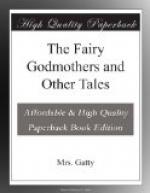To return to Time who is travelling fast on while I am rambling after the wind, he has puzzled the artists a good deal I should say, for with all their skill at representation they have never hit upon any better idea of him than an old Man with wings. An old man with wings! Can you fancy anything so unnatural! One can quite understand beautiful young Angels with wings. Youth and power and swiftness belong to them. Also Fairies with wings are quite comprehensible creatures; for one fancies them so light and airy and transparent, living upon honey dew and ambrosia, that wings wherewith to fly seem their natural appendages. But the decrepitude of old age and the wings of youth and power are a strange mixture:—a bald head, and a Fairy’s swiftness!—how ridiculous it seems, and so I think I may well say Time is a very odd sort of thing.
Among those who have to deal with Time, few are more puzzled how to manage him than we story-tellers. In my first chapter, for instance, I gave you a half-hour’s conversation among some Fairies, but I think you would be very angry with me were I to give you as exactly every half-hour that passed over the heads of the little girls with Fairy Godmothers, till they grew up. How you would scold, dear little readers, if I were to enter into a particular description of each child’s Nurse, and tell whether Miss Aurora, Miss Julia, Miss Hermione, &c. &c. &c. were brought up on baked flour, groat-gruel, rusks, tops and bottoms, or revalenta food! Whether they took more castor-oil, or rhubarb and magnesia; whether they squalled on those occasions or were very good. When they cut their teeth and how, together with all the &c. and ups and downs of Nursery life which large families, such as you and I belong to, go through daily.
Well then, suppose I altogether pass over a period of ten years, and enter into no minute particulars respecting that portion of Time. You must know that the Fairies had agreed that all the children should have the same (and rather a large) amount of intellect, or what you would call cleverness: that is to say, they were all equally capable of learning anything they chose to learn: also they had all fair health, plenty to eat and drink, and all the so called “necessary” comforts of life.




